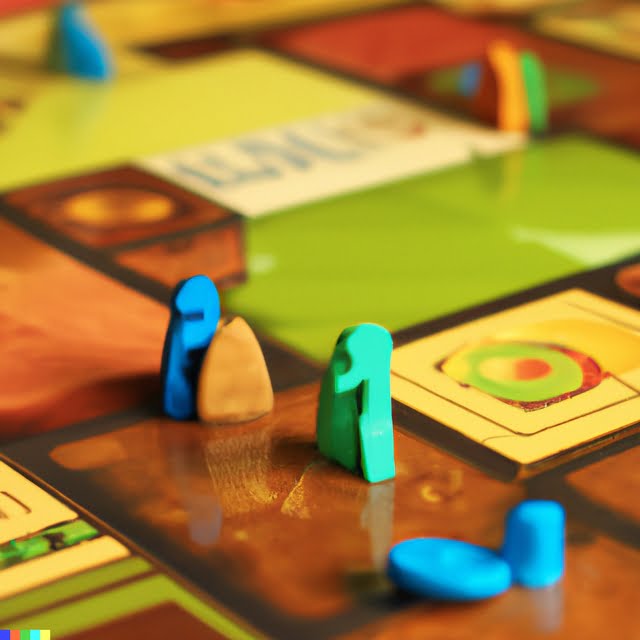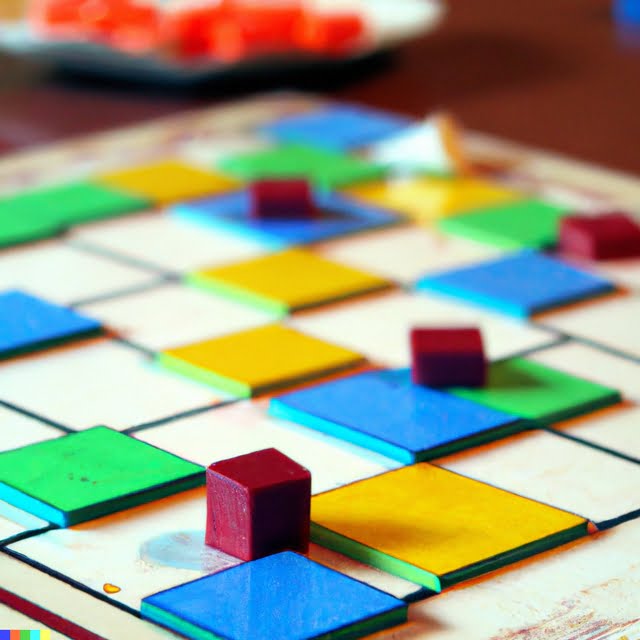Introduction
Catan, sometimes referred to in the United States as “Settlers of Catan,” is an exciting and highly popular board game originally created in 1995 by Klaus Teuber”a German game designer. It quickly rose to popularity world-wide, receiving multiple awards and praise from many board game enthusiasts and critics alike.
It is a multiplayer game for two to four players where each player assumes the role of a settler who is acquiring and trading resources like grain and ore around the mythical island of Catan in order to build roads, settlements, and cities. The goal of the game is for each participant to score 10 points through these activities. Points are awarded for building settlements or cities, having the Longest Road or Largest Army (through Development Cards), and obtaining points from the randomly rolling dice on check your turn: If you hold more commodities than any other player at any given time during a turn, then you are awarded Victory Points derived from Resource Cards. The first player to accumulate 10 Victory Points wins the game.
Besides its engaging theme derived from historical references such as colonization and economic development, what makes Catan so interesting is that it is also a highly unpredictable strategy game due to its mix of luck (rolling dice) with strategy (accumulating resources). Adding suspense and intrigue between players while not overpowering them with complex yet rigid rules make it appealing even to casual board gamers. Since its first publication almost three decades ago, Catan has solidified itself as one of the most recognizable contemporary classic board games today with over 23 million copies sold across 30 languages worldwide since 1995!
History
The Catan Board Game was created by Klaus Teuber in 1995, originally released as ‘Die Siedler von Catan’ in Germany. It has since become one of the most popular board games of all time and is even considered a classic. This award winning game has sold over 25 million copies worldwide to date, with numerous expansions and spin-off versions also being released.
Catan quickly gained popularity due to its strategic elements, represented by the resource trading system that puts players in competition with each other. It encourages creativity, problem-solving, teamwork and decision making, drawing in many players of different ages. The ease of playing the game allowed it to spread through word of mouth fairly quickly across multiple countries.
What made Catan truly stand out from traditional board games was its adaptation for technology platforms such as computers and mobile phones. This helps make the experience more immersive for players allowing them to join online communities to challenge players from around the world or play against an AI. Alongside this there have even been TV shows created revolving around the game which further helped propel its success. With continued development and more expansive play styles such as building on roads and cities, over 20 years later it still stands strong among new releases.
Gameplay
Catan is a strategic board game in which two to four players take on the role of settlers, exploring and colonizing the island of Catan. Players must build settlements, roads and cities to gain resources, which they need to create infrastructure and expand their territory. Throughout the game they may trade resources with one another or buy items from the supply. The goal is to receive 10 victory points by upgrading settlements or building cities.
Gameplay starts each turn when players roll the dice to generate resources for everyone on the board. Resources collected each turn depend on where settlements have been built; for instance, those placed near forests receive wood, those near wheat fields get grain, etc. On their turns players will use these resources to either upgrade existing settlements into cities (with 2 victory points each) or construct new buildings/roads among other things. Trading between players is allowed and can be used strategically if approached efficiently.
The game ends when a player reaches 10 victory points. The winner is whoever has accumulated a total of 10 points at this stage; any remaining players who have not reached ten are eliminated from play. Common strategies in Catan involve attempting to control certain resource routes so that others struggle to meet their needs, attacking opponents who threaten your own progress, trading for rarer cards that cannot easily be acquired and trying to maintain balance between different numbers (e.g ensuring 4-spaces are evenly spread throughout your dominion).
Expansion Packs
The Catan Board Game is an enjoyable, classic board game that is perfect for playing with friends and family. Expansion packs are available to add a new level of challenge, complexity, and interest to the game. The expansion packs include a variety of components that enhance the gaming experience. Examples of these components include additional game pieces such as wooden roads and settlements as well as cards featuring special rules and victory points. Other packs also have additional dice or tiles that expand upon the questions or trading options present in traditional Catan play. There is also a Cities & Knights expansion pack which allows players to select action cards similar to the development cards found in base gameplay. This enables players to build walls, roads, and churches while engaging in city improvement actions that result in larger trade benefits when crafting victory points at the end of each round thus adding another layer of strategy to the game. Additionally, some themed expansion decks are available based on historical figures, myths and creatures adding an extra element of fun for classic fans wanting something top-up their enjoyment of the game.
Variations
Catan is one of the most popular board games, played by dozens of people in many countries around the world. Its popularity has spawned a range of different versions, expansions and spin-offs, providing diverse gameplay experiences for its players.
The original version of Catan involves building a network of roads and settlements across an island map to earn points for each road and settlement built. This can be expanded upon with a number of different expansion packs, including the Seafarers expansion which adds boats to transport goods across the waters and additional trading opportunities, or the Cities & Knights expansion which adds challenges such as barbarians who threaten your settlements. Additionally, there are Starfarers and Explorers & Pirates editions set in space.
In addition to these official expansions of Catan by its publisher Mayfair Games, there have also been many remakes and fan-made editions designed by fans looking to create their own twists on the game. These include editions featuring characters from hit shows like Game Of Thrones or The Walking Dead, or variants trying new ideas such as Catan: Banking Edition where players use real money instead of development cards during their turns. Ultimately it’s this variety that encourages excitement about this classic board game among its millions of fans today!
Community
Catan is an incredibly popular board game that has won numerous awards and continues to captivate people all over the world. It’s a game of strategy and resource management designed for 3-4 players in which the players battle and cooperate to try to build the most successful settlements on the board.
The popularity of Catan has led to the creation of a vibrant community of players from around the globe who are passionate about the game and its many variations. There are regular tournaments hosted by local and international groups, with players competing for prizes or for charity. Players can also join or create social media forums in which they discuss strategic tactics, assets counters, purchasing decisions, as well as their love for the game.
In recent years, professional organizations have taken an active role in expanding the Catan universe through initiatives such as creating expansion packs and themed sets such as Star Trek-themed versions. New expansions come out frequently, alongside Apps with various new resources and gaming levels that keep people engaged no matter what version they own. New players can also join up with established community members online to learn more about gaming rules and strategizing while sharpening skills by playing against seasoned pros.
People who find themselves passionate about this beloved game have multiple opportunities to get involved through tournaments and online/offline events where they can practice skills, learn new tricks, win incredible loot or champion noble causes. The success of Catan lies within its universality; anyone ought to find something worth loving in this fantastic boardgame – regardless of competitive level or experience level – everyone needs only one thing: enthusiasm!
Conclusion
The Catan Board Game is a great strategy game that can be enjoyed by people of all ages. It offers an enjoyable experience where players develop and manage their own settlements as they accumulate resources from multiple hexagonal tiles. The exciting competition between players ensures that the game remains engaging throughout, with its well-thought-out rules allowing for new strategies to be implemented constantly. Additionally, the board game has a strong base of fan support, with numerous expansions and editions available to keep the gaming experience fresh and challenging. The only negatives about this game are that the randomness of dice roles determines the outcome too often, meaning sometimes experienced gamers can suffer disappointments; also it requires a lot of components which still make it hard to travel with. Despite these flaws, Catan Board Game is overall very well designed and provides an immense amount of replay value, making it one of the most popular board games in today’s market.

I love playing all kinds of games – from classics like Monopoly to modern favourites like Ticket to Ride.
I created this blog as a way to share my love of board games with others, and provide information on the latest releases and news in the industry.





